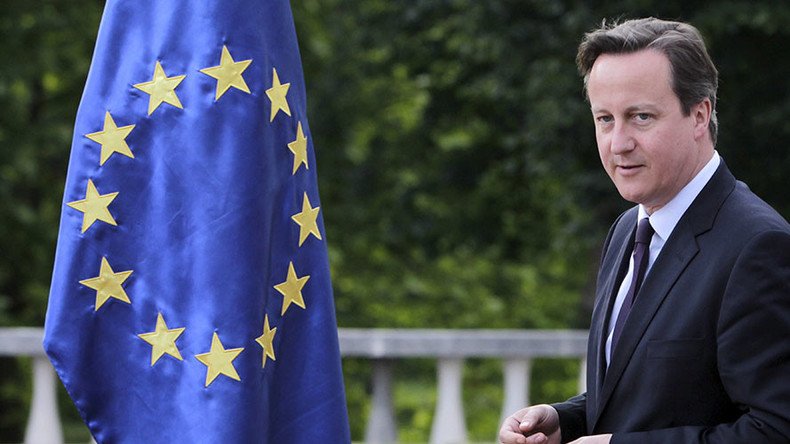Project Fear gets personal: Cameron equates Brexit to ‘self-harm’

David Cameron compares leaving the EU to ‘self-harm,’ a shipping lobby warns of a post-EU iceberg and a rogue entrepreneur decries Brexit ‘hysteria’. RT unravels the latest on Britain’s upcoming referendum.
With less than three months to go until June 23, more voices are being drawn into the debate over whether or not Britain should stay in the European Union (EU).
In the first two days of this week alone, the prime minister, a shipping lobby and an anti-EU entrepreneur have weighed in.
RT is keeping an eye on the whole Brexit soap opera.
Project Fear: RT unravels the latest scare tactics to keep Britain in the EU https://t.co/fdss7I7m0bpic.twitter.com/EcRndnwFUY
— RT UK (@RTUKnews) March 30, 2016
Brexit would be ‘act of self-harm’
The PM laid out his vision of what a post-Brexit Britain might look like on Tuesday. Predictably, it isn’t good.
Writing in the Telegraph, Cameron said Britain’s agriculture sector and service industries would be hit “hard” when European countries erect tariffs to protect their own companies from competition.
He warned jobs, prices and living standards would suffer a “massive knock-on effect.” The EU’s vengeance would be so strong, British airlines would even be barred from flying internal European routes such as Rome to Paris.
“I believe [Brexit] would be needless and reckless - an act of economic and political self-harm,” he said.
Bill Clinton on Brexit: N. Ireland will ‘get whacked’ if Britain leaves the EU https://t.co/vKP3fENf5Gpic.twitter.com/eVS8MJ0tG1
— RT UK (@RTUKnews) March 31, 2016
Shipping industry sees Brexit iceberg
The UK Chamber of Shipping also warned the EU may seek to punish Britain for leaving, in order to discourage others from following suit.
The Chamber’s chief executive, Guy Platten, said the shipping sector faces years of disruption if Britain leaves the EU.
He said the market would suffer as trade agreements are reworked and currency volatility leads to higher costs, at a time when the sector is facing a global downturn.
“The Brexit negotiations are unlikely to be quick or easy,” Platten cautioned.
"If it is lengthy, with tariffs and other penalties built in, then the consequences could be profoundly negative."
#Brexit campaign claims 250 business leaders as backers https://t.co/WE08v79m8Cpic.twitter.com/lhGCy278CR
— RT UK (@RTUKnews) March 27, 2016
Entrepreneur blasts Brexit ‘hysteria’
John Caudwell, founder of high street retail chain Phones 4U, called out the “hysteria” surrounding Brexit, adding it was “rubbish” to suggest three million jobs would disappear if Britain left the EU.
Caudwell told the BBC’s Today program that Britain lost £8 billion (about US$11.3 billion) each year because of its EU contributions.
“There is a lot of hysteria about why Britain should stay in. There is a lot of subjectivity,” he said.
“You hear three million jobs will be threatened as a result of leaving Europe. That is complete rubbish,” he added.
EU security bodies “of little consequence” to Britain – ex-spy chief backs Brexit https://t.co/KS1EFT5MGApic.twitter.com/ZfNP5YUjbs
— RT UK (@RTUKnews) March 24, 2016
Polls too close to call
An ORB poll for the Telegraph found there is only a 1 percent gap between Brits who want to stay in the EU and those who want to leave.
The survey initially found that 51 percent of voters would opt to remain, while just 44 percent would choose to leave.
ORB then asked those polled how likely they were to actually go out and vote.
Using these figures, they recalculated the poll and found that 49 percent support staying ‘In’ while 48 percent want ‘Out.’












